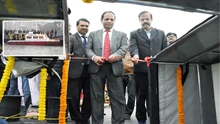
The HADP is a comprehensive programme aimed at addressing various challenges faced by the agriculture and allied sectors in J&K, including the dairy industry, as well as providing ample employment opportunities for the local population.
The HADP includes 29 innovative projects, including a five-year vision for dairy development in J&K. This dairy development project focuses on one of the most important components, namely increasing milk productivity through the wider implementation of Artificial Insemination (AI) through the involvement of private AI workers.
By successfully implementing this intervention, the J&K government hopes to increase average annual milk productivity from 2380 to 4300 litres by 2027. Artificial insemination in the dairy industry has been shown to be a highly effective tool for increasing average animal productivity and contributing to rural economic growth. Dairy farmers can benefit from the efficient use of high-quality bulls by using AI, without being limited by their location. There are numerous advantages to using AI over traditional breeding with bulls, including improved efficiency, cost-effectiveness, disease transmission reduction, and improved breeding efficiency.
One of the major impediments to expanding Artificial Insemination (AI) coverage in J&K is the limited network of government-run AI centres and the scarcity of trained AI technicians. To address this, the Dairy Development Project aims to increase AI coverage in rural India by establishing Multi Purpose Artificial Insemination Technicians ( Private AI workers). These private AI workers will provide self-sustaining AI services to farmers by collecting the cost of goods and services.
The project will directly benefit 1533 educated rural youth while indirectly benefiting approximately 7 lakh dairy farmers through increased productivity and milk production. Only 3.32 lakh breedable cattle are currently covered by AI, with the project aiming to cover 7.63 lakh cows within the next three years. To achieve 70% AI coverage over the next three years, the total number of AIs conducted will be increased by 10% in the first year, 22% in the second year, and 8% in the third year, year on year.
The project intends to train 1,533 young people from underserved and unexplored areas of Jammu and Kashmir as private Artificial Insemination (AI) workers. These individuals will be chosen through HADP and CSS-RGM and will receive Rs 30,000 in training at an accredited AI training institute. Over the course of two years, these trained private AI workers will be deployed in their respective villages to provide AI services to farmers.
If a private AI worker performs 600 AI procedures on average per year, they can easily earn Rs 1.08 lakh from AI work alone, in addition to additional income from minor veterinary practises. This project will increase the productivity of the bovine population in Jammu and Kashmir, resulting in indirect benefits for approximately 7 lakh dairy farmers in terms of increased productivity and milk production. The deployment of private AI workers in underserved areas of J&K has the potential to provide not only part-time employment opportunities for rural youth, but also to make veterinary healthcare and breeding services more accessible to farmers.
These AI workers will be able to improve the quality of nondescript low-yielding dairy animals in remote areas by using quality germplasm, resulting in the production of superior dairy animals within 5 years. This will result in a significant increase in average annual milk productivity, which is expected to reach 4300 litres per dairy animal by 2027-28. The implementation of this project will provide a much-needed boost to the dairy sector in underserved areas of J&K, contributing to the region's overall development.











